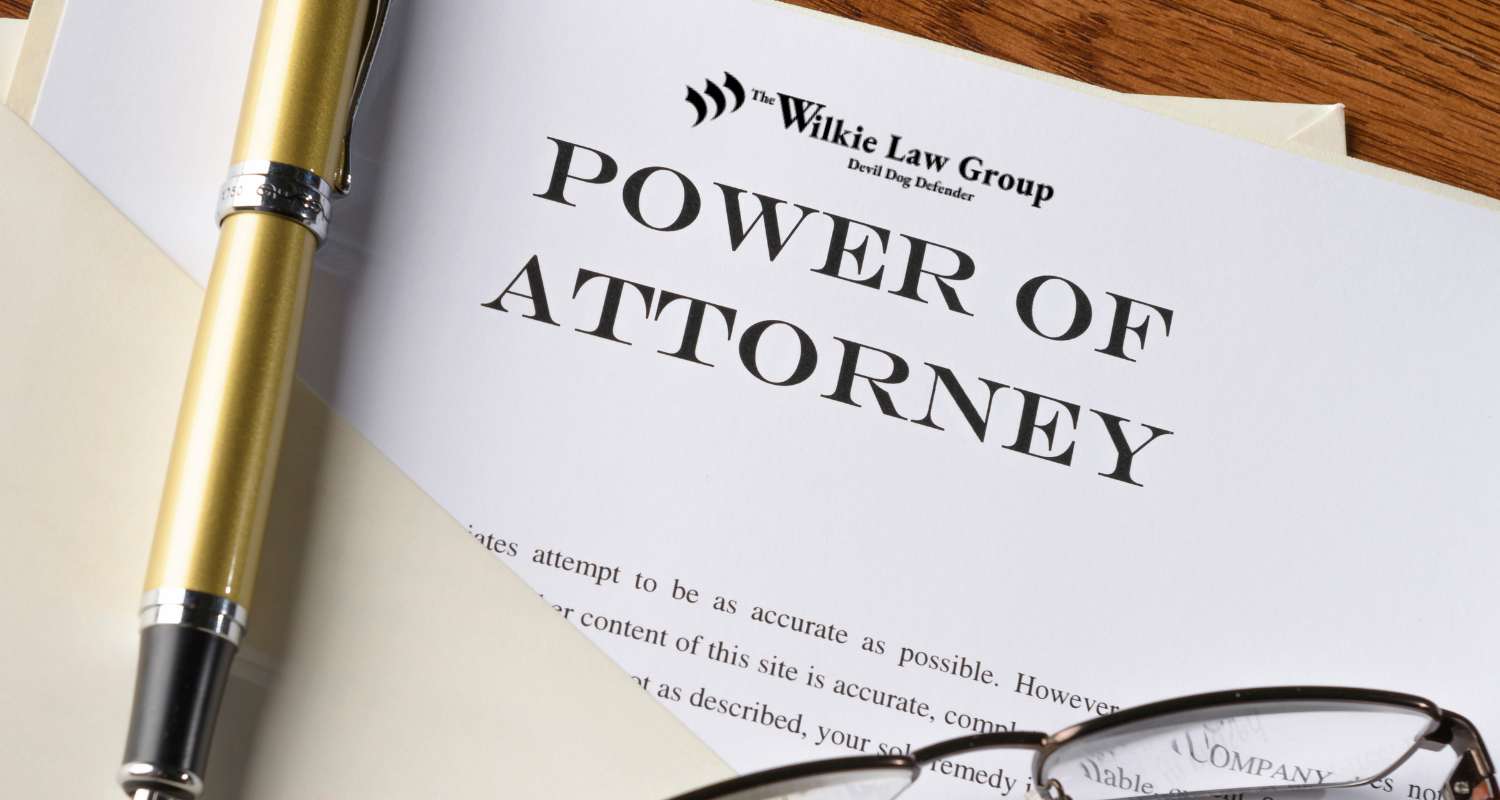Military Power of Attorney
Experienced Military Power of Attorney Counsel for Service Members
Home » Military Power of Attorney
Military Counsel
So, you’re in the military, and you’re expected to be deployed overseas for a long period of time with limited access to the outside world. What happens to your bank account? Your property? Your bills that need to be paid? These are all common concerns, and fortunately, they can all be addressed with a military power of attorney.
It is not uncommon for members of the military to need a power of attorney due to the nature of military duties. To hand off their responsibilities, they will need to properly sign over their affairs to a trusted representative. This could be their spouse, friend, sibling, or whoever they trust to have power over their legal and financial matters. If you’re a service member and you’re interested in creating a power of attorney, The Wilkie Law Group can help.

Aden Wilkie is a skilled civilian military attorney with years of experience handling military and civilian family law and criminal defense cases. Located in Jacksonville, North Carolina, Wilkie and his legal team work with military clients across the state, country, and worldwide. For help setting up, executing, or challenging a power of attorney document, call our law firm at (910) 333-9626 or reach out online to schedule a consultation today.
What is Military Power of Attorney?
A power of attorney, or POA, is a legal document that gives someone the ability to act on another’s behalf in the event that they cannot. Known as an agent or attorney-in-fact, this can be an organization or individual person authorized to control someone’s legal or economic affairs.
Military powers of attorney are often used when a service member is deployed and has limited communication or access to technology, making them unable to manage their affairs. This might be property, medical, or financial affairs. The service member will designate a person or organization they trust to act as the attorney-in-fact.

What Are the Different Types Of Power Of Attorney?
There are several different types of power of attorney, each with its own level of control. This includes general, limited or special, springing, and durable powers of attorney. We’ll break each of these down below.
General Power of Attorney
A general power of attorney is a legal document that grants an agent broad authority to manage a wide range of the principal’s affairs, including financial, legal, and personal matters. In the context of military powers of attorney, this allows service members to designate someone to handle their affairs while they are deployed or otherwise unavailable, ensuring their personal and financial responsibilities are managed in their absence and for a specified amount of time.
This broad range of legal matters could include any of the following:
- Buying assets or property
- Investing in assets or property
- Buying or selling real estate
- Exchanging or selling assets or personal property
- Handling insurance
- Handling bank accounts
- Settling claims
- Business interests of any kind
- Making donations or gifts
- Binding contracts of any kind
Because a general power of attorney has access to so many of your assets, you’ll need to be careful in choosing this route and representative. General power of attorney is often used in the military when someone is deployed for long periods of time and needs someone to handle all their assets until they return. Should you decide this is best, make sure the person is financially responsible and that you can trust them.
Limited or Special Power of Attorney
A limited or special power of attorney is one that is given specific powers for a designated amount of time. When drafting this POA, you will list particular matters or a specific transaction you wish for them to handle. This may be that you want them to handle only matters dealing with real estate, household goods, or a business relationship.
A special or limited power of attorney is most often used when service members are experiencing health problems or are simply bogged down with commitments. It can also be used when a service member is expected to be gone for a shorter period of time.
Springing Power of Attorney
A springing power of attorney becomes effective only when a specified event takes place, typically the incapacitation of the principal. This can be particularly important for military personnel by ensuring that their personal, financial, and legal matters are handled seamlessly in their absence or during periods of incapacity, without granting immediate, unrestricted authority to the agent.
Durable Power of Attorney
A durable power of attorney is one that will remain intact even in the case you become mentally or physically incapacitated. Say you choose a general or springing/limited POA while you’re still able to handle your own affairs. If in the future, you become incompetent or unable to, these POAs will immediately become invalid. That is unless you specify durable power of attorney.
Having a durable power of attorney in line in case of your incapacity removes the possibility that a court will order a guardian or conservator for you.

Military Power of Attorney FAQs
How Do You Get Military Power Of Attorney?
Getting power of attorney in any type is done as a cautious measure to avoid future complications. You’re already making a cautious decision in assigning one, but you also need to be careful in how you go about getting one. There are a few things to consider when obtaining a military POA.
Every state is different in how it handles powers of attorney. In North Carolina, in order for the court to accept power of attorney forms, the person creating it must be of sound mind (mentally competent) and must sign documents in the presence of a notary public.
Many financial institutions require you to use their own power of attorney form.
An experienced North Carolina military family lawyer can help you figure out the specific applications you must sign and make sure you cross all your T’s and dot all your I’s.
Finally, be sure to review the forms with your lawyer to ensure you signed everything you need to and all of your specifications are made clear and in the proper legal language.
Who Can Override a Military Power Of Attorney?
Who is able to legally override a POA depends on a few factors. One factor is the type of POA in question, and another is why the override is being pursued in the first place.
In any case, the person who the power of attorney is acting over, also called the Principal, is able to override the decision at any time.
However, there are times when the Principal may not be able to see themselves being exploited or taken advantage of. For example, if the person has a durable POA and they’ve become incapacitated, the Agent is legally required to act in their best interest. If a close family member notices that the agent elected to care for their loved one’s financial or medical matters is abusing their power, they may be able to override them. This family member could be a parent, spouse, child, or sibling.
Does a Power of Attorney Have an Expiration Date?
Yes, powers of attorney can have an expiration date. The specific duration of a POA document is usually determined by the principal at the time of creation and outlined in the documentation itself.
For example, limited or special powers of attorney often have a specified end date or are valid only for the duration of a particular transaction or event. General POAs typically remain in effect until revoked by the principal or when the principal becomes incapacitated. Durable powers of attorney, on the other hand, remain in effect even if the principal becomes incapacitated, but they can also have an expiration date if one is specified in the document. Finally, springing POAs can either have a set duration or remain effective until the principal’s death or revocation.
How Can You Take Power Of Attorney Away From Someone?
If it is your own power of attorney you wish to revoke, you can do so at any time as long as you’re mentally competent, though you’ll need an attorney to execute the termination.
If it is someone else’s POA, you’ll need to be related to the Principal in some way. If you meet this criteria, the next steps are as follows:
- Obtain a lawyer
- Speak with the Principal
- If the person is mentally stable, express your concerns with them. They may hear you out and revoke the POA themselves.
- Approach the Agent
- If the Principal refuses to terminate the POA, ask the Agent to respectfully step down. You can do this through your attorney to avoid face-to-face conflict.
- If the Agent refuses, the POA will fall onto an Alternate Agent if one is listed. In the case that there is no Alternate Agent, you will then need to make a court application.
- Prepare yourself for court
- You and your lawyer will need to convince the judge that the Agent has abused his or her power. You will also be required to prove that the Principal is mentally unstable and cannot see this for themselves.
Does a Military Power of Attorney Have to Be Notarized?
Yes, according to both federal law (10 U.S.C Section 1044(a)) and state law (NC Statutes § 32C-1-105), in order to be considered valid, military POA forms must be notarized. The notary must verify the authenticity of the signature on the document.
Where Can I Get a Military Power of Attorney?
To obtain a military power of attorney, service members can consult with their base’s legal assistance office. Military members in North Carolina, across the United States, and worldwide can also obtain qualified and experienced legal help from military family lawyers like those at The Wilkie Law Group. Our team provides comprehensive military family legal services to ensure all legal documents, including powers of attorney, meet necessary requirements and provide the needed protection.

Experienced Fort Bragg and Camp Lejeune Power of Attorney Legal Assistance
If you are a service member interested in obtaining a POA, let Attorney Aden Wilkie and his team at The Wilkie Law Group help you. Located in Jacksonville, NC, our law firm is proud to represent members of the armed forces stationed at Camp Lejeune, Fort Bragg, and numerous other bases, camps, stations, and posts across the United States and worldwide. We regularly work with members of the Air Force, Army, Navy, Marine Corps, and the National Guard, so we know the unique requirements for each branch and situation.
Contact The Wilkie Law Group, Military Defender
As a skilled legal assistance attorney, Aden is dedicated to providing service members and their families with sound advice and knowledgeable assistance to mitigate risk and ensure their affairs are managed effectively. Whether you’re part of the active duty military, reserves, or national guard, we can help you establish a valid power of attorney to act on your behalf. Call us at (910) 333-9626 or fill out our online form today for a consultation.
